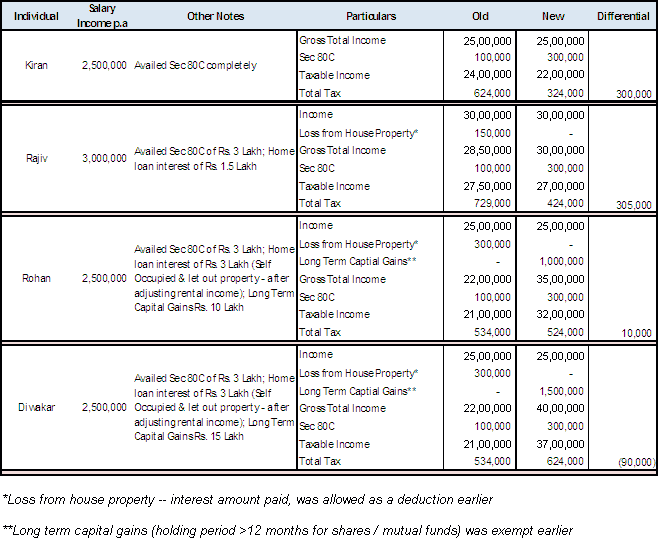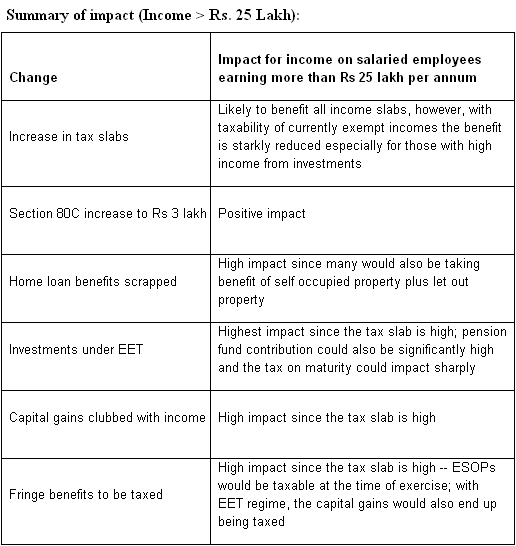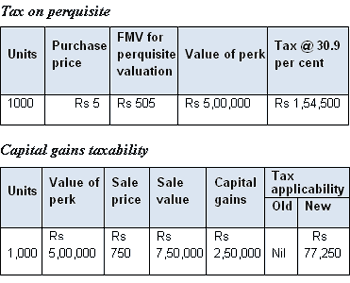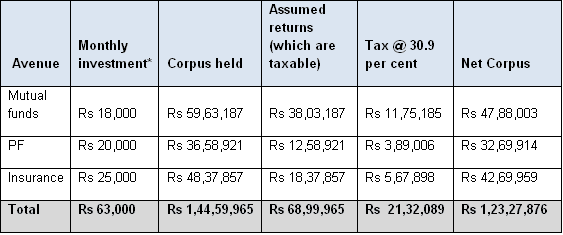 | « Back to article | Print this article |
How will the new tax code impact you: 3
How will the new tax code impact you: 1
How will the new tax code impact you: 2
In the final part of the series on direct tax code we evaluate its impact on those earning a salary greater than Rs 25 lakh per annum. It is bad news for them because a lot of their reimbursements would end up being taxable at the highest tax rate consequent to the change in the budget.
We evaluate the possible impact of the new Direct Tax Code if it comes into being in the current form.
Home loan benefits: A big tax break taken away!
For one, they could afford multiple homes with hefty EMIs, thereby providing them a significant tax break. Considering that they were at the highest tax bracket, the savings from home loan interest benefits would have been very significant. This is all set to vanish from the scene with the proposed tax code.
A large number of individuals in this bracket owned a second house and claimed the tax benefit on let-out properties as well. Now for an investor, it may make sense to use a complete deployment of funds for acquiring the home and is likely to also curtail purchase of houses as an investment.
Also read:
How will the new tax code impact you: 1
How will the new tax code impact you: 2
Shares and ESOPs/ mutual funds: Gains get dearer
While individuals in this bracket were unable to save taxes on their salaried and other taxable income beyond a certain point, they were able to effectively pay significantly low taxes on their income from their investments by choosing tax efficient options. This included a zero tax on long-term capital gains on their equity investments.
The special rates are proposed to be removed; the exemptions on long-term capital gains will no longer exist. The investor may end up paying a Herculean amount as taxes on their investment income compared to the current regime. This is likely to have a significant impact on persons with higher capital gains income, since they will be taxed at normal rates.
This can be better understood with an example.
Let's assume one Kiran Shaw is granted 1,000 shares @ Rs 5 per share as ESOPs from his company, the average price on the date of exercise is Rs 505; the tax is levied based on this price at normal rates (up to 30.9 per cent -- valuation of ESOPs). Kiran holds the ESOPs for over 12 months and sells it at Rs 750. Currently, he need not pay any taxes on the gains that he makes, however, with the new tax code, he will have to pay taxes at normal rates -- 30.9 per cent. This is explained in the tables above.
Exempt-exempt-taxable regime
In this income level the contribution towards provident fund would be higher and this would have significant impact if the maturity amount gets taxed. Further, for someone with an income greater than Rs 25 lakh, the entire proceeds would be taxed at highest tax bracket @30 per cent rate. Here's a quick review of how various investments would be impacted by the EET regime over the full term of the investment of 10 years:
In the above example, a client who builds a corpus over the next 10 years of Rs 1.45 crore, with the EET (exempt-exempt-taxable) regimen coming into picture, he could possibly lose a whooping Rs 21.32 lakh from his portfolio which is essentially taxes paid under the new regimen. All of the above would be tax-free under the current regime (mutual funds are assumed to be long term).
* Returns assumed at appropriate rates (these are only indicative); Term of contribution is assumed @ 10 years
How various scenarios could pan out
To understand this better for various persons, let us take a few scenarios on the impact after 2011:

The removal of home loan interest benefit and taxing long term capital gains could have a significant impact on the people coming under this category. In fact, it would as well erode the benefit extended by means of lower tax rates.

If an individual has a simple income earning mechanism with only salary income things couldn't get better than this. In the above case, Kiran saves a whooping Rs 3 lakh. In fact if one were to have a lower home loan interest, the higher Sec 80C benefit would net-off the non-availability of home loan benefit.
The benefits fade when capital gains income gets added and is taxed at normal rates: for Diwakar this regime could not help one bit and Rohan, too is not a happy person.
Anil Rego is the founder and CEO of Right Horizons , an investment advisory and wealth management firm that focuses on providing financial solutions that are specific to customer needs.



